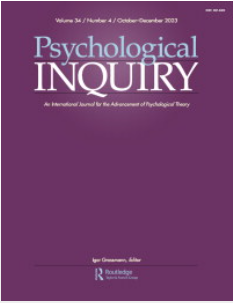不靠面包:非现代政治与苦难的根源
IF 7.2
2区 心理学
Q1 PSYCHOLOGY, MULTIDISCIPLINARY
引用次数: 0
摘要
Baumeister和Bushman(这个问题)对为什么左翼和右翼之间的冲突是不可避免的,有时是敌对的,并且容易升级提出了一个吝啬的解释。他们提出,减少政治两极分化强度的一种方法是让政治右翼和左翼人士接受轮流安排。他们关于为什么权力交替可以有效减少群体间冲突的论点的核心是,两党都支持对社会有用的价值观,即使他们的目标并不总是反映在他们的政策中。他们的文化动物理论的核心假设是,右翼优先考虑积累资源,而左翼优先考虑分享或重新分配资源。如果每一方都有机会领导并将其优先事项转化为政策,那么一个政权的过度行为可以被下一个政府的过度行为所抵消,社会就会因此而改善。我们对他们的分析提出了一些看法,并对他们的理论提出了一些合理的修正意见。鲍迈斯特和布什曼提出的在民主国家中最有利于促进群体生存、繁荣和社会稳定的模式是辩证的。在这方面,他们与黑格尔(1807/2019)和马克思(1867/2004)等思想家占据着相同的领域,他们也认为,走向优越最终状态的历史进步是由相互竞争的群体之间的冲突造成的。我们可以想象,政治辩证法是如何产生更健康、更繁荣的集体的。例如,人们可能希望放纵他们对基于投票的社会实验的渴望,让他们从将一方的价值观转化为行动的积极和消极结果中学习。我们还从作者的论点中发现了价值,即政治对手之间的权力交流通常比长期的一党统治更可取(与作者一样,我们承认历史上也有例外,这种统治可以产生稳定和繁荣的社会)。也就是说,我们提出了一种替代鲍迈斯特和布什曼没有充分探索的政治转向过程的方法,但这也可以减少政治敌意:温和。适度可以被定义为“刻意不寻求最大的情感或最充分的成就”(Fukuyama,2022,第154页)。我们坚持认为,无论哪个政党执政,如果双方都不试图将其引向远离大多数人所能合理忍受的方向,而不会受到生存威胁、道德困惑和愤世嫉俗地脱离政治生活,那么对社会的破坏就会更小。通过政治辩论和其他制度中介过程,一个可行的社会是一个能够整合相互竞争的观点,创造不极端的互利解决方案的社会(Carrese,2016)。重要的是,权力的交替并不是遵循温和路线的必要条件。本文章由计算机程序翻译,如有差异,请以英文原文为准。
Not by Bread Alone: Immoderate Politics and the Roots of Suffering
Baumeister and Bushman (this issue) present a parsimonious explanation for why the conflict between the left and right is inevitable, sometimes hostile, and prone to escalation. They propose that one way to reduce the intensity of the political polarization is for people on the political right and left to accept a turn-taking arrangement. Central to their argument for why alternations in power can be effective for reducing intergroup conflict is that both parties endorse values that are functional for society, even if their aims are not always reflected in their policies. The core assumption of their cultural animal theory is that the right prioritizes amassing resources, while the left prioritizes sharing or redistributing resources. If each side is given a chance to lead and translate their priorities into policy, the excesses of one regime can be counterbalanced by the excesses of the next, and society will improve as a result. We offer a few observations about their analysis and suggest some plausible amendments to their theory. The model Baumeister and Bushman introduce as being most advantageous for promoting group survival, flourishing, and social stability in a democracy is dialectical. In this regard, they occupy the same territory as thinkers like Hegel (1807/2019) and Marx (1867/2004), who also believed that historical progress toward a superior end-state results from conflict between competing groups. We can imagine how a political dialectic could produce healthier, more prosperous collectives. For instance, people might wish to indulge their desire for voting-based social experimentation, allowing them to learn from the positive and negative outcomes of translating one party’s values into action. We also find merit in the authors’ argument that exchanges in power between political opponents are generally preferable to a prolonged single party rule (like the authors, we acknowledge that there are historical exceptions where such a rule can produce stable and prosperous societies). That said, we suggest an alternative to the process of political turn-taking that Baumeister and Bushman did not sufficiently explore, but that could also reduce political animosity: moderation. Moderation can be defined as “the deliberate effort not to seek the greatest emotion or the fullest accomplishment” (Fukuyama, 2022, p. 154). We maintain that regardless of which party is in power, it is less disruptive to society if neither one attempts to steer it in a direction too far from what most people can reasonably endure without becoming existentially threatened, morally confused, and cynically disengaged from political life. Through political debate and other institutionally mediated processes, a workable society is one that can integrate competing views to create mutually beneficial solutions that are not at the extremes (Carrese, 2016). Importantly, an alternation in power is not essential for a course of moderation to be followed.
求助全文
通过发布文献求助,成功后即可免费获取论文全文。
去求助
来源期刊

Psychological Inquiry
PSYCHOLOGY, MULTIDISCIPLINARY-
CiteScore
10.30
自引率
1.10%
发文量
31
期刊介绍:
Psychological Inquiry serves as an international journal dedicated to the advancement of psychological theory. Each edition features an extensive target article exploring a controversial or provocative topic, accompanied by peer commentaries and a response from the target author(s). Proposals for target articles must be submitted using the Target Article Proposal Form, and only approved proposals undergo peer review by at least three reviewers. Authors are invited to submit their full articles after the proposal has received approval from the Editor.
 求助内容:
求助内容: 应助结果提醒方式:
应助结果提醒方式:


